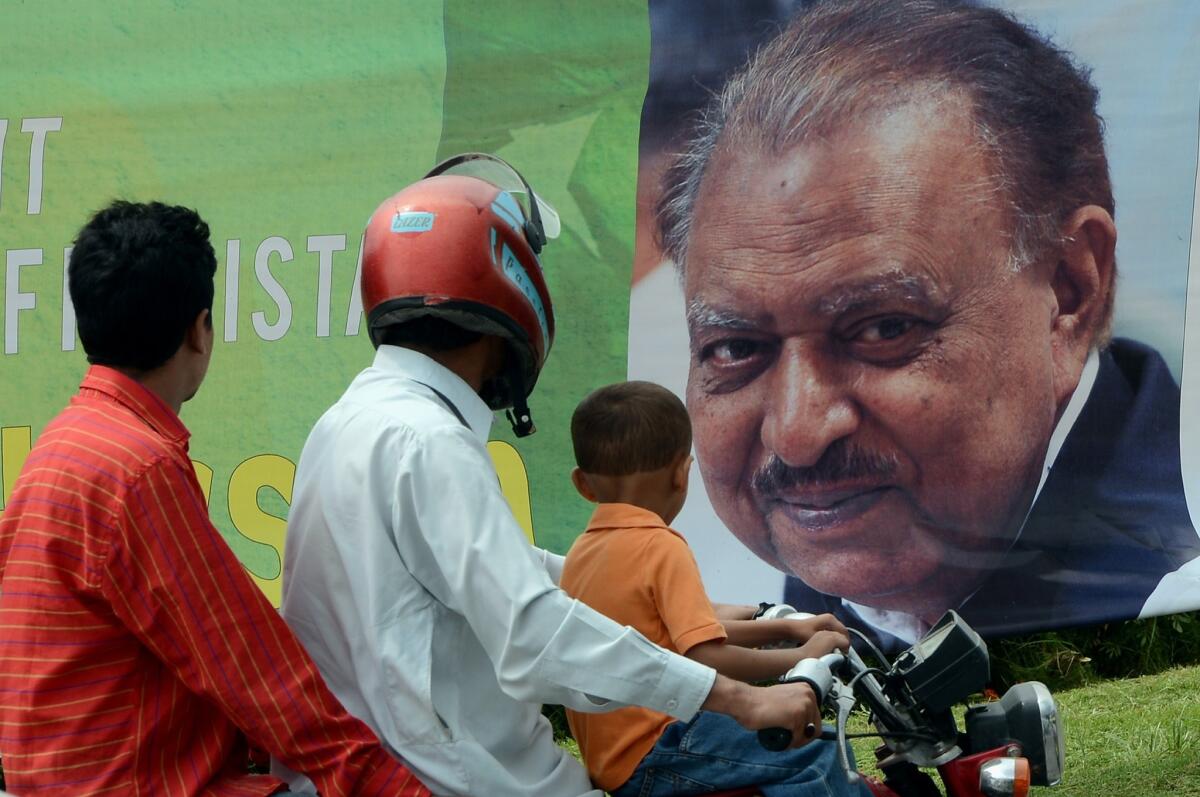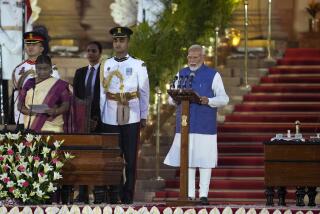Pakistan swears in new president, may open talks with Taliban

ISLAMABAD, Pakistan â Mamnoon Hussain was sworn in as Pakistanâs new president Monday, replacing Asif Ali Zardari, who becomes the first democratically elected president in the nationâs history to complete a full term.
The post of president is largely ceremonial in Pakistan and the occupant is chosen by national and provincial lawmakers. Hussain, 73, a businessman from Karachi and a former state governor, has close ties to Prime Minister Nawaz Sharif and his Pakistan Muslim LeagueâN party.
Zardari, 58, the widower of assassinated former Prime Minister Benazir Bhutto, stepped down Sunday after an honor guard ceremony officiated by the armed forces.
Hussainâs swearing-in came as leaders of more than a dozen political parties gathered at a conference led by Sharif and agreed to negotiate with militant groups in the lawless tribal areas bordering Afghanistan, groups that have sought to topple the government.
In telephone calls to news media, Taliban spokesman Shahidullah Shahid said his group welcomed the governmentâs offer of talks and would convene within a few days its central council, which would form a team to negotiate and formalize its demands.
Sharif was elected in May on a pledge to bolster security and improve Pakistanâs beleaguered economy. Once in office, he outlined his preference for peace talks over military strikes. Major political partiesâ support for that approach Monday should give Sharif the political cover he needs to move ahead.
The parties expressed âfull confidenceâ in the prime ministerâs efforts and called on the federal government to âinitiate the dialogue with all stakeholders forthwithâ in a six-point communique passed at the conference, held at the prime ministerâs residence.
The conference attendees also underscored their desire to defend national sovereignty and to oppose U.S. drone strikes, which they said were undercutting Islamabadâs âefforts of eliminating extremism and terrorism.â They added that Pakistan would raise the drone issue with the United Nations if necessary.
Army chief Gen. Ashfaq Kayani told the attendees that the government and armed forces were on the same page in their approach to tackling terrorism, local media reported. The conference participants also expressed concern that the international community didnât fully acknowledge the sacrifices made by the Pakistani people in countering terrorism.
A key problem with the plan to talk with the militants, analysts said, is the number of players on both sides of the table.
The Pakistani Taliban is a disparate collection of extremist groups that wonât necessarily agree among themselves or abide by any terms that are hammered out. Similarly, the major political parties donât have a good record of agreeing to and sticking with a unified counter-terrorism approach.
Ultimately, a deal will depend on the goodwill of the Taliban, some said.
âIf they come forward with their nonsense demands and they refuse to recognize the constitution of Pakistan and refuse to accept democracy, then there will be no success in the talks,â said Talat Masood, a security analyst and retired army lieutenant general. âThen there will be a fight.â
But the fact that several parties have backed Sharifâs approach should strengthen his hand.
âThe government will have this political support in talks, and even if the talks fail, and the government decides to take military action, this political support will stay, even then,â Masood said.
ALSO:
An insult grows into violence in India; 31 dead
Egypt wages major offensive against Islamists in Sinai Peninsula
Syria backs Russian proposal for handing over chemical weapons
Twitter: @markmagnier
Special correspondent Khan reported from Islamabad and Times staff writer Magnier from New Delhi.
More to Read
Sign up for Essential California
The most important California stories and recommendations in your inbox every morning.
You may occasionally receive promotional content from the Los Angeles Times.










